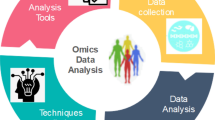
Overview
- The book provides practical guidance on the implementation of machine learning methods
- Its emphasis on reproducibility, transparency, and open databases and repositories facilitate replication
- Special attention to the challenges and opportunities presented by multi-omics data integration
Access this book
Tax calculation will be finalised at checkout
Other ways to access
About this book
The advancement of biomedical engineering has enabled the generation of multi-omics data by developing high-throughput technologies, such as next-generation sequencing, mass spectrometry, and microarrays. Large-scale data sets for multiple omics platforms, including genomics, transcriptomics, proteomics, and metabolomics, have become more accessible and cost-effective over time. Integrating multi-omics data has become increasingly important in many research fields, such as bioinformatics, genomics, and systems biology. This integration allows researchers to understand complex interactions between biological molecules and pathways. It enables us to comprehensively understand complex biological systems, leading to new insights into disease mechanisms, drug discovery, and personalized medicine. Still, integrating various heterogeneous data types into a single learning model also comes with challenges. In this regard, learning algorithms have been vital in analyzing and integratingthese large-scale heterogeneous data sets into one learning model.
This book overviews the latest multi-omics technologies, machine learning techniques for data integration, and multi-omics databases for validation. It covers different types of learning for supervised and unsupervised learning techniques, including standard classifiers, deep learning, tensor factorization, ensemble learning, and clustering, among others. The book categorizes different levels of integrations, ranging from early, middle, or late-stage among multi-view models. The underlying models target different objectives, such as knowledge discovery, pattern recognition, disease-related biomarkers, and validation tools for multi-omics data.
Finally, the book emphasizes practical applications and case studies, making it an essential resource for researchers and practitioners looking to apply machine learning to their multi-omics data sets. The book covers data preprocessing, feature selection, and model evaluation, providing readers with a practical guide to implementing machine learning techniques on various multi-omics data sets.
Similar content being viewed by others
Keywords
Table of contents (9 chapters)
-
Front Matter
-
Back Matter
Editors and Affiliations
About the editors
Abedalrhman Alkhateeb earned his Bachelor's degree in Computer Science from the University of Jordan, Amman, Jordan, in 2004, and his MSc and Ph.D. in Computer Science from the University of Windsor, Canada, in 2011 and 2018, respectively. He is currently an Assistant Professor at Princess Sumaya University for Technology in Amman, Jordan. Previously, he served as an Assistant Professor and Mitacs Accelerate Postdoctoral Fellow at the University of Windsor, Canada. His research interests include machine learning, deep learning, bioinformatics, and health informatics.
Abedalrhman Alkhateeb has authored and co-authored more than 50 papers in prestigious journals and conferences. He also organized a workshop titled “MODI: Machine Learning Models for Multi-omics Data Integration” for three consecutive years from 2019 to 2021 in conjunction with ACM Conference on Bioinformatics, Computational Biology, and Health Informatics (ACM BCB). His recent research focuses on the health outcomes of various types of cancers. He has gained industrial experience as a bioinformatician and data analyst in several organizations, including ITOS Oncology Inc. and BlackBerry Limited in Canada, and UAE University in the United Arab Emirates.Luis Rueda received his Bachelor’s degree in computer science from the National University of San Juan, Argentina, in 1993, and his Master’s and Ph.D. degrees in computer science from Carleton University, Canada, in 1998 and 2002, respectively. He is currently a Full Professor in the School of Computer Science at the University of Windsor. His current research interests are mainly focused on devising shallow and deep machine learning and representation learning algorithms at the fundamental level and applications in bioinformatics and cybersecurity to problems in biomedical imaging, transcriptomics, integrative genome-wide data analysis, identification of cancer biomarkers, user authentication, spam review detection and social engineering.Luis Rueda holds four patents on machine learning and cybersecurity and has more than 200 publications and presentations in prestigious journals and conferences in machine learning, computational biology, and cybersecurity. He currently serves as Associate Editor of IEEE/ACM Transactions on Computational Biology and Bioinformatics, and Network Modeling Analysis in Health Informatics and Bioinformatics. He is also a member of the program committees of several conferences in the field. He is also a Senior Member of the IEEE, and a Member of tBibliographic Information
Book Title: Machine Learning Methods for Multi-Omics Data Integration
Editors: Abedalrhman Alkhateeb, Luis Rueda
DOI: https://doi.org/10.1007/978-3-031-36502-7
Publisher: Springer Cham
eBook Packages: Computer Science, Computer Science (R0)
Copyright Information: The Editor(s) (if applicable) and The Author(s), under exclusive license to Springer Nature Switzerland AG 2024
Hardcover ISBN: 978-3-031-36501-0Published: 14 November 2023
Softcover ISBN: 978-3-031-36504-1Due: 15 December 2023
eBook ISBN: 978-3-031-36502-7Published: 13 November 2023
Edition Number: 1
Number of Pages: VI, 168
Number of Illustrations: 2 b/w illustrations, 30 illustrations in colour
Topics: Bioinformatics, Machine Learning, Data Mining and Knowledge Discovery, Health Informatics, Bioinformatics



